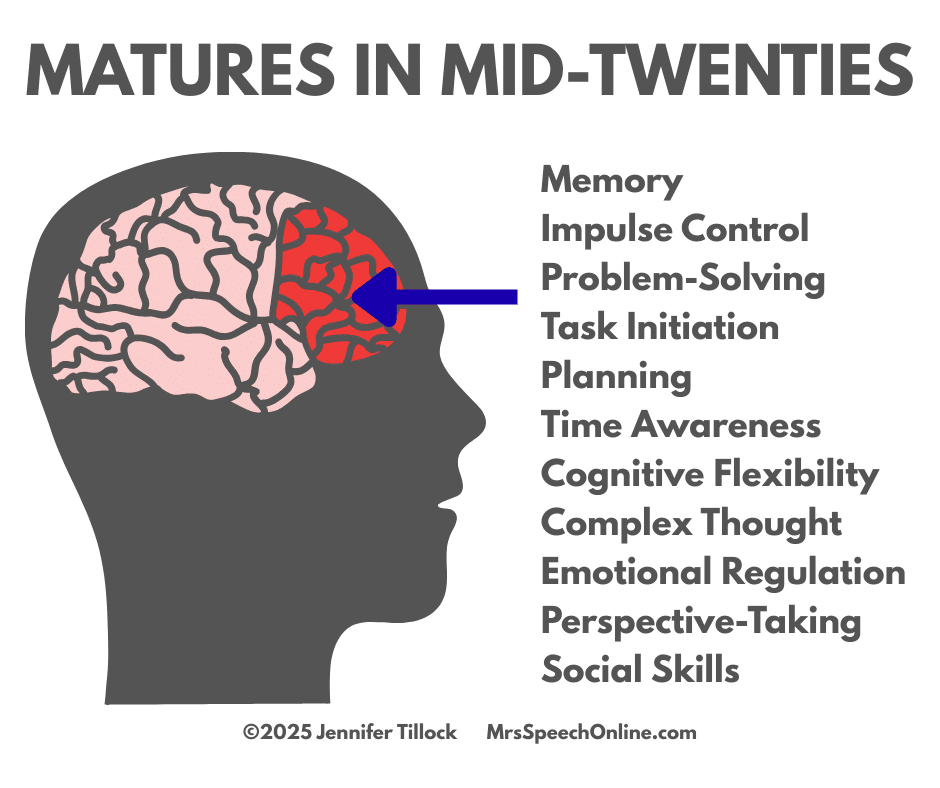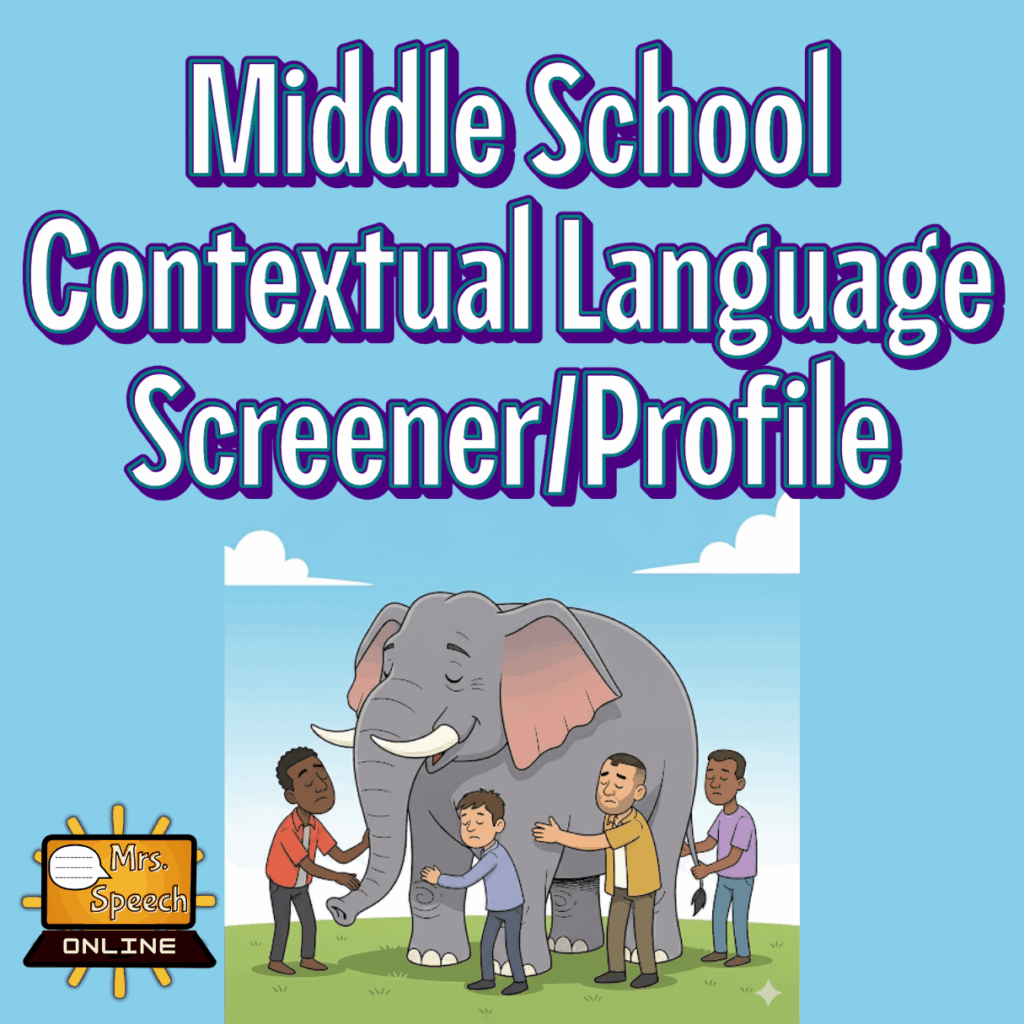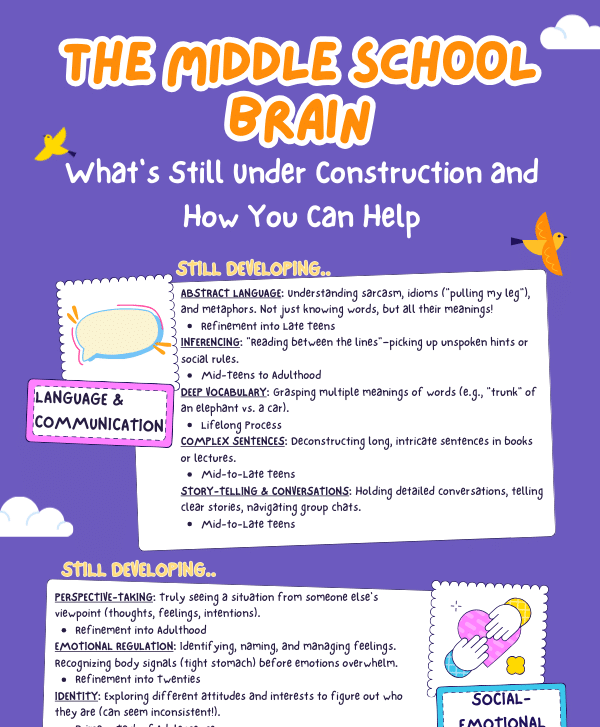
The Truth About Brain Development in Middle School
As an SLP, parents and teachers are often concerned about middle school language development. They often ask me about a student who just doesn’t seem to “get it.” They’ll describe a child who takes everything literally, misses a joke, or seems to lack empathy. Since these kids are fluent speakers who sound like adults, it’s easy to assume these behaviors are a sign of a problem.
This is the middle school paradox. We assume that since their language sounds mature, their brains are fully equipped to handle complex social and communication skills. But what the lack or immaturity of these skills wasn’t a sign of a delay, but evidence of a developing brain? The truth is, while middle schoolers are great at sounding mature, their ability to handle the subtle, unspoken parts of communication is still a work in progress.
The Middle School Brain is Still Developing
It might seem they’ve suddenly grown up, but a middle schooler’s brain is still under construction. The prefrontal cortex, which handles complex thinking and self-control, won’t be fully developed until they are in their mid-twenties. This means many of the skills we adults take for granted are still being built. And honestly, don’t we all struggle with some of these things ourselves, no matter our age?
Understanding Abstract Language

Think about sarcasm, idioms, or metaphors. When a teacher says, “Oh, that’s just what I needed,” after a student drops papers everywhere, most adults get the joke. A middle schooler might not. Understanding this requires going beyond the literal words and reading the person’s tone and context.
This is also where inferencing comes in—it’s the ability to “read between the lines” and figure out what’s not explicitly stated. While a student might be able to define idioms on a school test, using and understanding them in a fast-paced, real-life conversation is much harder. Understanding colorful phrases is a still developing middle school language skill.
PSST: Read my last post “Beyond “Spill the Beans”: Why Teaching Idioms Needs a Modern Glow-Up,” for more information on this skill.
Navigating Social Cues
This is more than just empathy—it’s the ability to see things from another person’s point of view. Middle schoolers are so focused on figuring out their own identity that they can seem self-centered. It’s not a lack of caring; it’s a natural part of their social language development in middle school. A person has to understand their own self before they can truly understand others.
Part of this age’s awkwardness is that as they try to figure out their own identity, middle schoolers often “try on” different attitudes, styles, and interests. A student who is quiet one week might be outspoken the next. This isn’t being fake; it’s a natural form of social experimentation as they explore different versions of themselves.
Handling Big Emotions
Middle schoolers understand basic feelings like happy or sad, but they often struggle to name more complex emotions like frustration or anxiety. This can lead to them acting out because they lack the vocabulary to express what they’re truly feeling.

They might feel a physical response—a tight stomach, a pounding heart—without knowing what emotion is causing it. They’re also still developing the self-awareness and self-talk needed to pay attention to these body signals before they become too overwhelming.
More Skills Developing in Middle School Brains
A few other language skills are still growing in middle schoolers, affecting their ability to learn and succeed.
Vocabulary and Word Knowledge
It’s not just about learning new words, but understanding all the different meanings and contexts for a single word. For example, a student might know that “trunk” refers to a suitcase, but they may not yet understand its use in phrases like “elephant trunk” or “tree trunk.”
Complex Language Comprehension
While they are using more sophisticated language, they can still struggle to fully understand long, grammatically intricate sentences in academic texts. The ability to break down and process this kind of intricate language is a skill that develops with exposure and explicit instruction.

Memory and Metacognitive Strategies
Middle schoolers are not only learning new things, but they are also beginning to learn how they learn. They’re developing metacognition—the ability to think about their own thinking. This includes learning and applying strategies for memory, such as using mnemonic devices or chunking information to make it easier to remember.
How You Can Help Middle School Language Development
Your support is the scaffolding they need to build these crucial skills. Here’s how you can help:
- Don’t Just Clarify, Explain. If you use sarcasm, follow up by saying, “I’m just being silly; I actually didn’t need that.” This helps them learn to spot a joke.
- Keep It Simple During High Emotion. When a middle schooler is upset, their thinking brain is offline. Use minimal words and direct instructions, like “Sit down. Breathe.”
- Talk It Through. Help them reflect on social situations. Ask, “Your friend looked sad. Why do you think that is?” This helps them practice perspective-taking and gives them the language to identify complex emotions.
Their challenging behaviors are often a sign of a developing brain, not a lack of effort or intelligence. By viewing them as a work in progress, we can provide the guidance they need to become capable and confident adults.
A Final Thought: The Power of Perspective
Middle school is a time of immense change, and much of the behavior that adults find confusing or frustrating is simply a reflection of a brain that is in an incredible, albeit awkward, state of growth. By reframing our perspective, we can stop seeing challenging behaviors as defiance. We can start viewing them, not only as naturally developing middle school language skills, but also as opportunities for teaching and connection.
As an SLP, I’ve seen firsthand that a little understanding and a lot of patience can make all the difference. Your support today is the scaffolding they need to build the crucial skills that will help them succeed as capable, compassionate, and confident adults.
For a more intensive way to pinpoint where a middle schooler needs support, consider my Middle School Contextual Language Screener/Profile. It uses an intentionally written fable as context to naturally pull out academic skills such as figurative language, multiple meanings, inferencing and problem solving.


You’ve learned about all the different areas where the middle school brain is still developing. But how do you keep track of it all? To make it easy, I’ve created a comprehensive, one-page chart that summarizes all these skills in a simple, visual format. It’s a great tool to keep handy for a quick reminder—you could even hang it in the teacher’s lounge!
Download your free infographic: “The Middle School Brain: Your Quick Guide to Developing Skills” by subscribing to my newsletter!
Social Media Icons: designed by rawpixel.com – Freepik.com













